Neem Oil For Dandruff: 8 Easy DIY Treatments In 2025
Easy tips to help you reap the maximum benefits of this oil and clear dandruff flakes.
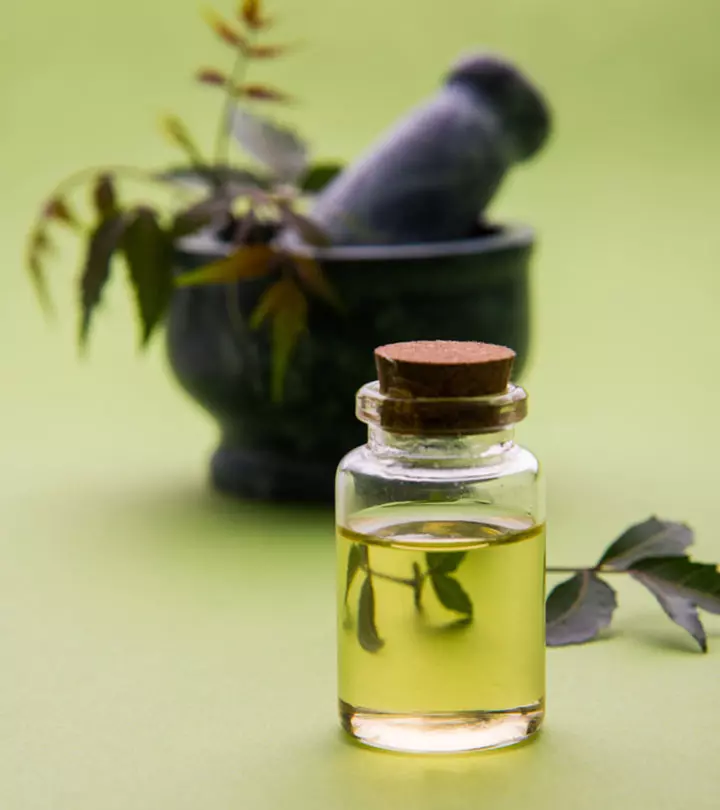
Image: Shutterstock
Most branded anti-dandruff shampoos are filled with chemicals that may leave your scalp dry and your hair rough, fragile, and dull. A safe and natural alternative is using neem oil for dandruff. Neem oil is known for its therapeutic effects on the body, but it also helps effectively treat dandruff. It replenishes and strengthens your hair, making it healthy. In this article, we will explain how effective neem oil is in preventing and treating dandruff. Keep reading to know the various ways you can use neem oil.
In This Article
How Is Neem Oil Derived?

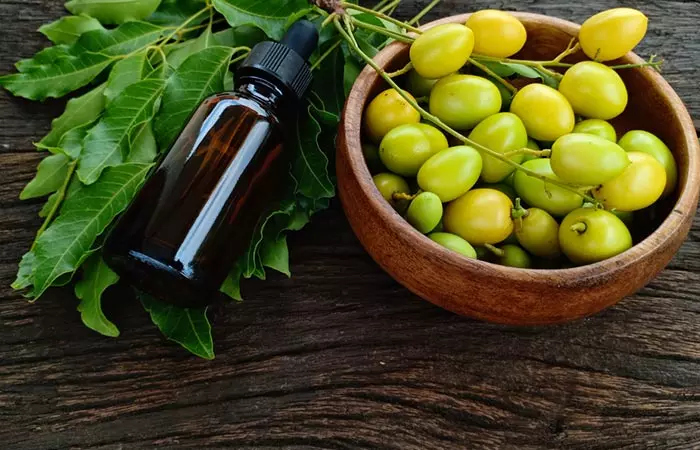
Neem oil is derived from the seeds and fruits of the neem tree (Azadirachtaindica) that is native to the Indian subcontinent. The oil has been used in traditional Indian medicine for treating many skin and hair ailments. Essential oils are often used in herbal treatments, and neem oil is one such oil that has been used for centuries in Ayurveda for skin health. It works as a natural cure for several conditions thanks to its antifungal, antioxidant, and anti-inflammatory properties. Neem oil can nourish your hair and treat dandruff and scalp inflammation, thus promoting healthy hair growth. It is also a great home remedy for itchy scalp. We will understand this mechanism in the following section.
Key Takeaways
- Neem oils have antifungal properties that can combat dandruff.
- People with sensitive scalp can dilute the neem oil with olive oil to prevent itchiness and tingling.
- Avoid refrigerating neem oil or storing it near boiling water.
How Does Neem Oil Help Treat Dandruff?
Neem oil’s antifungal properties can help treat dandruff (1). It is effective against dandruff-causing fungi, including Candida and Malassezia. Its active constituent is nimbidin that has anti-inflammatory and antiseptici An antimicrobial substance that is applied on a wound or a cut to prevent any kind of infection or sepsis. properties. Nimbidin helps suppress scalp inflammation and treats psoriasisi An immune-mediated skin disease that causes rashes with scaly and itchy patches on the scalp, elbows, and knees. , dermatitisi A general term used to indicate medical conditions involving skin irritation. Common symptoms include inflammation and itchiness. , eczema (2), and other forms of scalp irritation (2). Many anti-dandruff shampoos come with neem oil formulations.
Some anecdotal evidence suggests that regular use of neem oil can also help balance the pH of your hair. Also, when it comes to hair care, it is also an excellent choice for those with seborrheic dermatitis, as it can help reduce dandruff and soothe an itchy scalp. This, in turn, may boost scalp health and prevent dandruff.
We will now discuss how you can use neem oil for dandruff treatment.
How To Use Neem Oil For Dandruff Treatment
1. Neem Oil And Apple Cider Vinegar

The use of apple cider vinegar (ACV) for dandruff treatment warrants more research. However anecdotal evidence suggests that ACV may balance scalp pH and reduce dry scalp conditions. It has a pH of 4.5 to 5.5 (similar to that of the scalp). The vinegar is also believed to help fight bacterial infections that may otherwise lead to scalp issues.
You Will Need
- 1 tablespoon of neem oil
- 2 tablespoons of ACV
Procedure
- Mix 1 tablespoon of neem oil with 2 tablespoons of ACV.
- Apply the mixture to your scalp and massage well.
- Wrap a towel around your head or put on a shower cap.
- Leave it on for about 20 minutes.
- Wash with a mild shampoo.
 Quick Tip
Quick Tip2. DIY Neem Oil Shampoo
A neem oil shampoo can offer a convenient way to treat dandruff. Preparing it is easy.
You Will Need
- ½ teaspoon of neem oil
- A regular shampoo
Procedure
- Add the neem oil to your regular shampoo bottle.
- Gently shake the bottle.
- Use it as usual by massaging it into a lather.
- Rinse with lukewarm water.
- Apply Use this shampoo once weekly for best results.
 Quick Tip
Quick Tip3. Neem Oil And Olive Oil
You can use olive oil to dilute the neem oil and make it suitable for those with a sensitive scalp. Using olive oil to treat dandruff is effective, as it contains antifungal properties that treat dryness and soothe itchiness. Olive oil works as a natural conditioner. It moisturizes dry scalp and may help with dandruff treatment (4). It is also said to possess antifungal properties that may help treat dry scalp and itchiness.
You Will Need
- 1 tablespoon of olive oil
- 1 tablespoon of neem oil
Procedure
- Mix the olive and neem oils.
- Apply the mixture to your scalp and massage for 10 minutes.
- Wrap a towel around your head or put on a shower cap.
- Leave it on your scalp for 20 minutes.
- Wash your hair with a mild shampoo.
4. Mix Of Herbs With Neem Oil
Combine the neem oil with the goodness of bhringaraj, shikakai, and fenugreek powder. These ingredients possess anti-fungal and anti-bacterial properties and may help treat dandruff (5), (6), (7).
You Will Need
- A few drops of neem oil
- A few basil leaves
- 1 teaspoon of bhringraj powder
- 1 teaspoon of shikakai powder
- 1 teaspoon of fenugreek powder
Procedure
- Mix all the ingredients in a clean bowl.
- Apply the mixture to your scalp and hair.
- Wrap a towel around your head or put on a shower cap.
- Leave it on your scalp for 30 minutes.
- Wash your hair with a mild shampoo.
5. Neem Oil With Lemon Peel
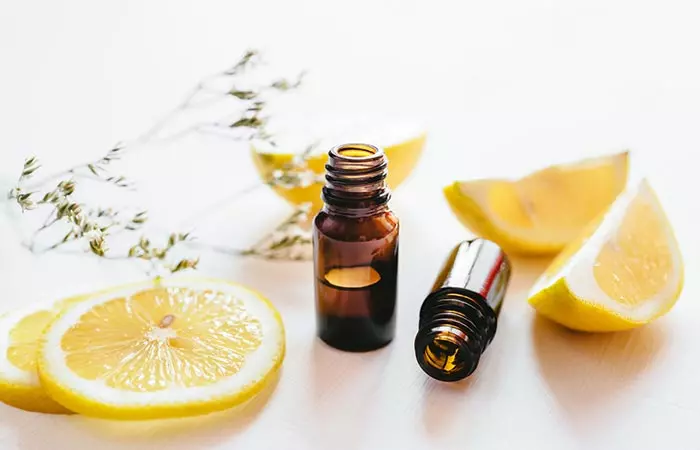
Lemon peel is known for its antifungal properties and helps prevent scalp infections (8). It may treat dandruff when used with neem oil.
You Will Need
- A few drops of neem oil
- 1 lemon peel
Procedure
- Mix the neem oil and lemon peel in a clean bowl. You should get a non-sticky solution.
- Apply this mixture to your hair and leave it on for 30 minutes.
- Rinse with lukewarm water.
6. Neem Oil And Yogurt
Yogurt contains Lactobacillus paracasei, bacteria that can help treat dandruff (9). These bacteria help restore the scalp’s natural microbiomei A community of microorganisms living together in an environment, such as bacteria, fungi, and viruses. balance. Yogurt also cools an itchy scalp and nourishes your hair.
You Will Need
- Few drops of neem oil
- 1 cup of yogurt cup of curd
Procedure
- Mix the neem oil and yogurt.
- Apply the paste to your scalp and hair.
- Wrap a towel around your head or put on a shower cap.
- Leave it on the scalp for 30 minutes.
- Wash with a mild shampoo.
7. Neem Oil With Carrier Oil

Concentrated neem oil can be tough on your scalp. Hence, always dilute it with a carrier oil like that of jojoba or coconut.
You Will Need
- A few drops of neem oil
- 2 tablespoons of a carrier oil
Procedure
- Mix both the oils and apply the mixture to your scalp.
- Massage thoroughly.
- Wrap a towel around your head or put on a shower cap.
- Leave it on for 30 minutes.
- Rinse with a mild shampoo.
8. Neem Oil And Tea Tree Oil
Tea tree oil possesses antifungal properties that are effective against the dandruff-causing fungus Malassezia furfur (10). Its antiseptic, antibacterial, anti-inflammatory, and antioxidant attributes may also help maintain clean and healthy hair (11).
You Will Need
- 2 tablespoons of neem oil
- 5-7 drops of tea tree oil
Procedure
- In a small bowl, mix the neem oil and tea tree oil.
- Apply the mixture directly to your scalp, gently massaging it in.
- Leave it on for at least 30 minutes to allow the oils to penetrate your scalp.
- Shampoo your hair to wash out the oils thoroughly.
- Repeat this treatment 2-3 times a week for noticeable results.
Note:
Exercise caution with tea tree oil as it can cause skin sensitivity in some individuals.
Additionally, you can also pair neem oil with other essential oils, such as lavender and peppermint, to enhance its effectiveness. Lavender oil is known for its calming properties that may help soothe an itchy, irritated scalp (12). Peppermint oil provides a refreshing cooling effect and helps improve blood flow to the scalp.
Can I Apply Neem Oil Directly To Hair?
Anecdotal evidence suggests that applying neem oil directly (without diluting) to the scalp may cause a flaky scalp, which may lead to irritation.
Apart from these simple ways, you can take the following steps to prevent dandruff using neem oil.
Tips For Using Neem Oil
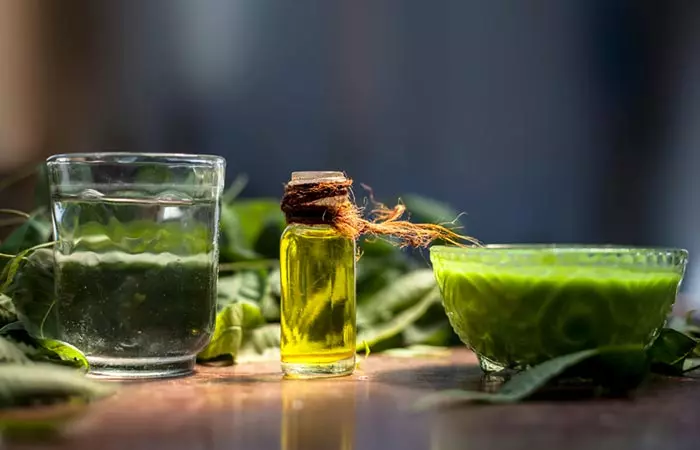
- Store neem oil in a cool, dry place and away from direct sunlight.
- Do not refrigerate neem oil.
- Do not place neem oil near boiling water.
- Some people are sensitive to neem oil. Hence, do a patch test before applying it to your scalp.
Infographic: 4 Ways To Use Neem Oil For Dandruff
Neem oil has been used in traditional medicine for centuries to treat various ailments. It has antifungal and anti-inflammatory properties that may help treat dandruff, scalp inflammation, and itchiness. Check out the infographic below to learn about the different ways to use neem oil to treat dandruff.
Some thing wrong with infographic shortcode. please verify shortcode syntaxNeem oil’s components may nourish your hair and aid in treating dandruff, itching, and scalp inflammation. Follow the steps outlined above to get rid of dandruff with neem oil. While moderate use of neem oil is harmless, excessive use of undiluted oil might irritate the scalp. More research is needed to prove the efficacy of neem oil in dandruff treatment. You can begin using the oil two or three times a week with a carrier oil. If you have any negative side effects, talk to your doctor.
Frequently Asked Questions
What hair types benefit most from neem oil?
Neem oil works great for all hair types, but is especially helpful for those with oily or dry scalps. It may help balance oil production and calm dry, irritated skin. If you have dandruff, neem oil may help reduce flakiness and soothe your scalp. It is also great for curly or textured hair, as it adds moisture and promotes a healthy scalp.
Can neem oil be used on colored hair?
Yes, neem oil is safe for colored hair. It nourishes the scalp and keeps your hair healthy without affecting the color. However, you should do a patch test first to make sure there are no adverse reactions, especially if your hair is freshly dyed.
How long does neem oil take to work?
Neem oil takes 1-2 weeks of regular use to show results.
How often can you apply neem oil?
Diluted neem oil can be applied once daily for 1-2 hours. However, it’s worth noting that leaving it on your hair overnight or applying it more frequently can cause irritation.
Can neem oil be used as a preventative measure to avoid future dandruff flare-ups?
Yes, neem oil has antifungal and antibacterial properties that help in keeping the scalp and hair healthy and preventing future dandruff flare-ups.
How long does it typically take to see results from using neem oil for dandruff?
It can take anywhere from a couple of days to a few weeks to see results from using neem oil for dandruff depending on your hair texture and scalp skin type.
Is neem oil safe to use in combination with other hair care products?
Yes, neem oil is safe to use in combination with other hair care products. However, do a patch test before combining the two products, especially if you have sensitive skin.
Can neem oil be used to treat dandruff in children or is it only recommended for adults?
In general, neem oil is safe to use. But it is best to check with a doctor before using it for children.
Are there any dietary changes that can complement the use of neem oil for dandruff treatment?
Eating a healthy diet may improve your hair and scalp condition and can complement the use of neem oil for dandruff treatment.
Is neem oil better than coconut oil?
Both neem and coconut oil are good for hair and scalp and have different benefits. Additionally, it depends on individual hair and scalp requirements.
Where should you not use neem oil?
Avoid using neem oil on sensitive skin areas, such as around the eyes or open wounds. It’s recommended to do a patch test before altering your hair or skincare routine.
How many times a week should I apply neem oil to my hair?
It’s recommended to apply neem oil once or twice a week. It is best to consult a doctor if you have any pre-existing skin or scalp-related issues.
Illustration: Ways Neem Oil Can Reduce Dandruff
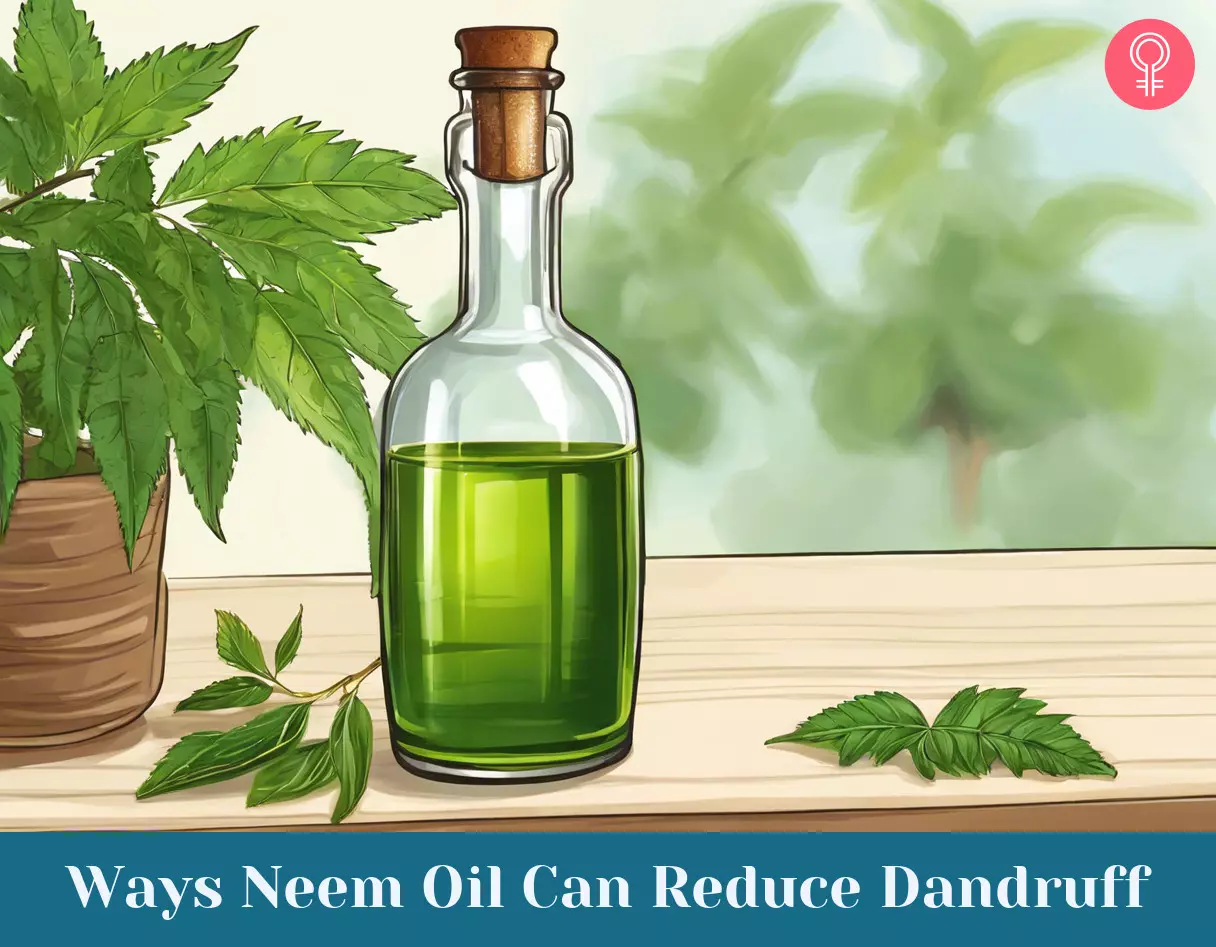
Image: Stable Diffusion/StyleCraze Design Team
Learn how to make your own neem oil for fast, long, and natural hair growth and the treatment of dandruff, eczema, itchy scalp, and lice. Get the best results with this easy DIY video tutorial!
References
Articles on StyleCraze are backed by verified information from peer-reviewed and academic research papers, reputed organizations, research institutions, and medical associations to ensure accuracy and relevance. Read our editorial policy to learn more.
- Exploration of Nutraceutical Potential of Herbal Oil Formulated from Parasitic Plant
https://www.ncbi.nlm.nih.gov/pmc/articles/PMC3957245/ - Neem in Dermatology: Shedding Light on the Traditional Panacea
https://www.ncbi.nlm.nih.gov/pmc/articles/PMC8906293/ - Nimbidin suppresses functions of macrophages and neutrophils: relevance to its anti-inflammatory mechanisms
https://pubmed.ncbi.nlm.nih.gov/15174005/ - Ethnopharmacological survey of home remedies used for treatment of hair and scalp and their methods of preparation in the West Bank-Palestine
https://www.ncbi.nlm.nih.gov/pmc/articles/PMC5499037/ - Ethnopharmacological Significance of Ecliptaalba(L.) Hassk. (Asteraceae)
https://www.ncbi.nlm.nih.gov/pmc/articles/PMC4897414/ - Stability and solubility improvement of Sompoi (Acacia concinnaLinn.) pod extract by topical microemulsion
https://www.ncbi.nlm.nih.gov/pmc/articles/PMC7032130/ - Fenugreek Leaf Extract and Its Gel Formulation Show Activity Against Malassezia furfur
https://pubmed.ncbi.nlm.nih.gov/31524496/ - Antifungal activity of lemon (Citrus lemon L.), mandarin (Citrus reticulata L.), grapefruit (Citrus paradisi L.) and orange (Citrus sinensis L.) essential oils
https://www.sciencedirect.com/science/article/abs/pii/S0956713507002629 - The positive benefit of Lactobacillus paracasei NCC2461 ST11 in healthy volunteers with moderate to severe dandruff
https://pubmed.ncbi.nlm.nih.gov/28789559/ - Antifungal Activity of the Essential Oil of Melaleuca alternifolia (Tea Tree Oil) against Pathogenic Fungi in vitro
https://karger.com/spp/article-abstract/9/6/388/819613/Antifungal-Activity-of-the-Essential-Oil-of?redirectedFrom=fulltext - Melaleuca alternifolia (Tea Tree) Oil: a Review of Antimicrobial and Other Medicinal Properties
https://www.ncbi.nlm.nih.gov/pmc/articles/PMC1360273/ - The Effects of Lavender Essential Oil and its Clinical Implications in Dentistry: A Review
https://pmc.ncbi.nlm.nih.gov/articles/PMC9357533/
Read full bio of Dr. Shruti Chavan
Read full bio of Arshiya Syeda
Read full bio of Ramona Sinha
Read full bio of Swathi E





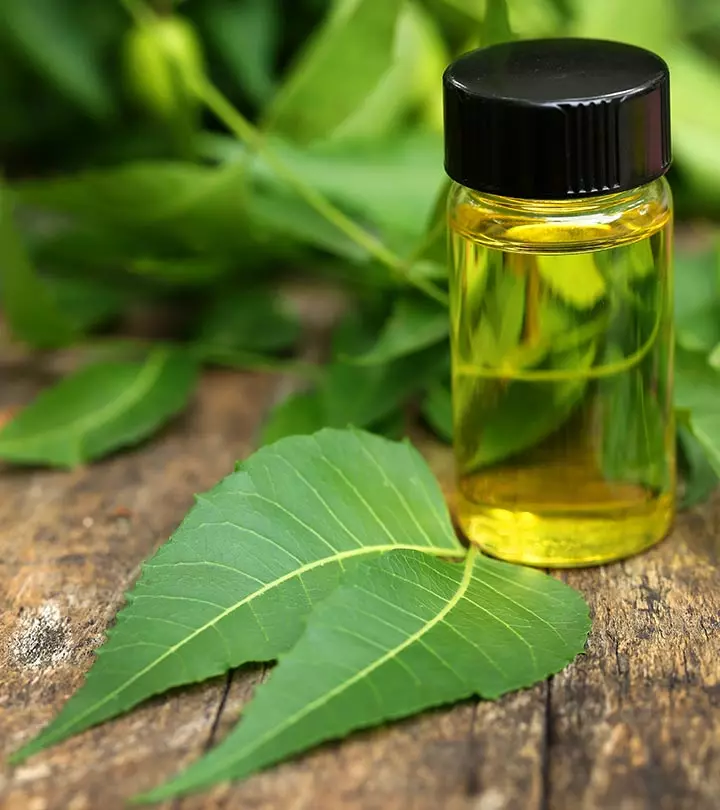
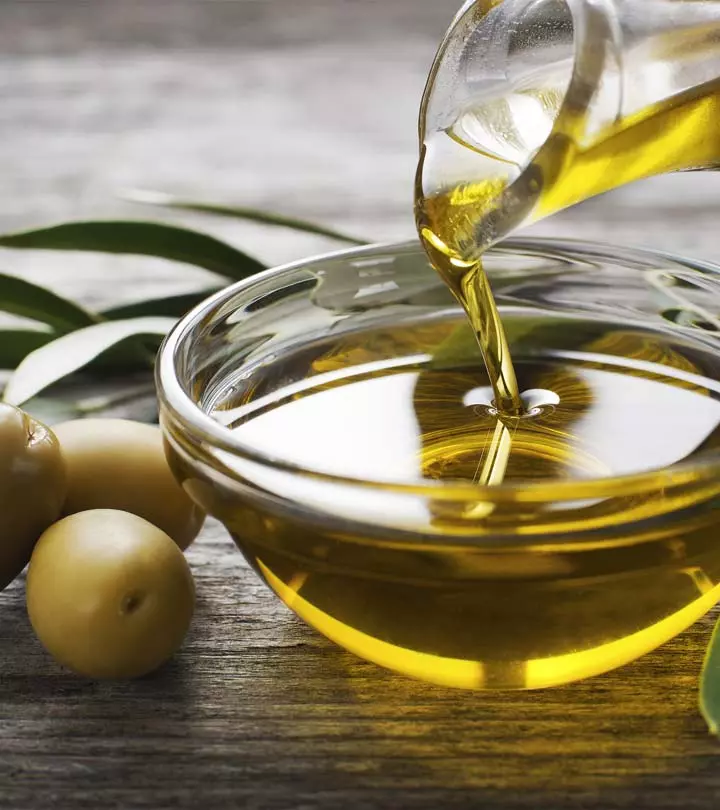
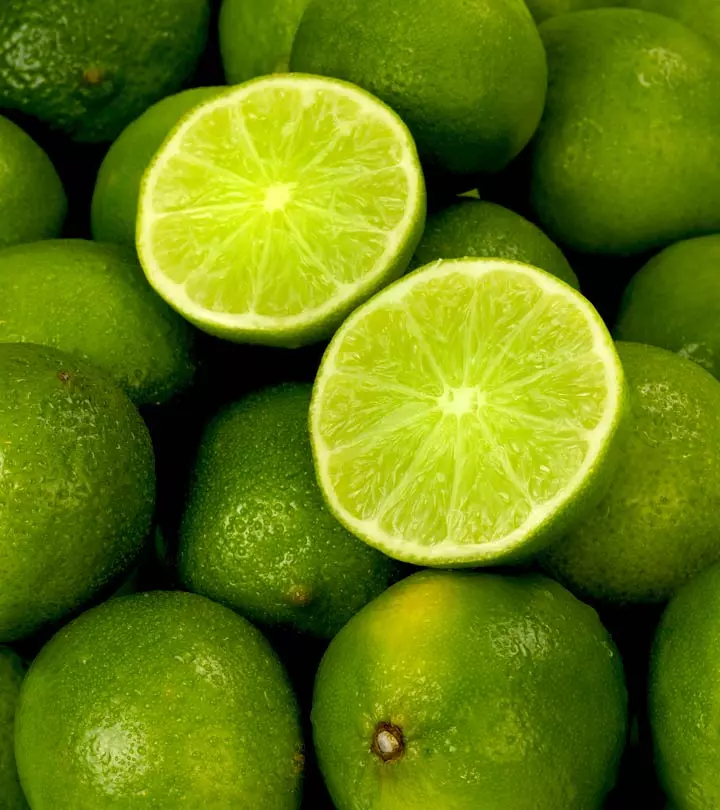
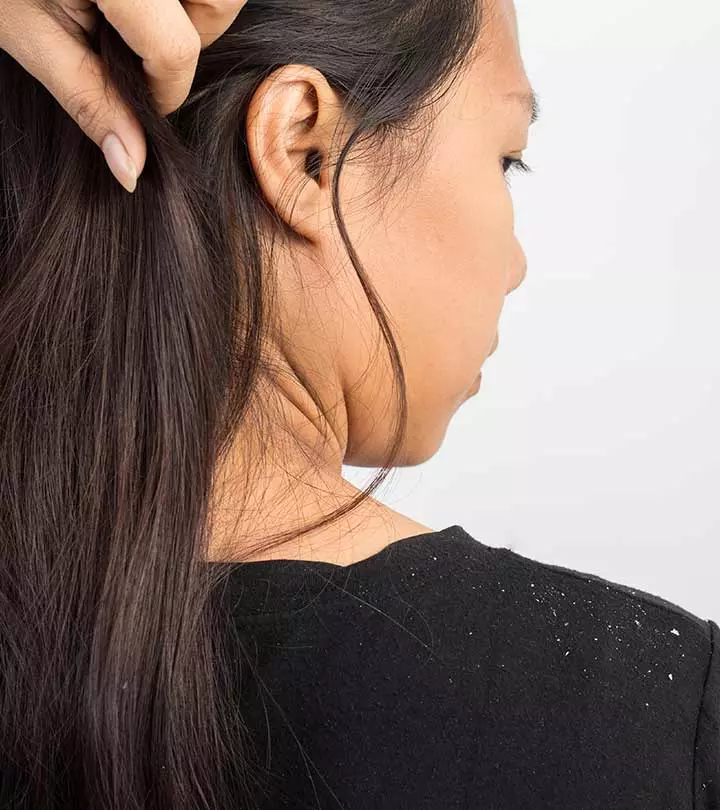

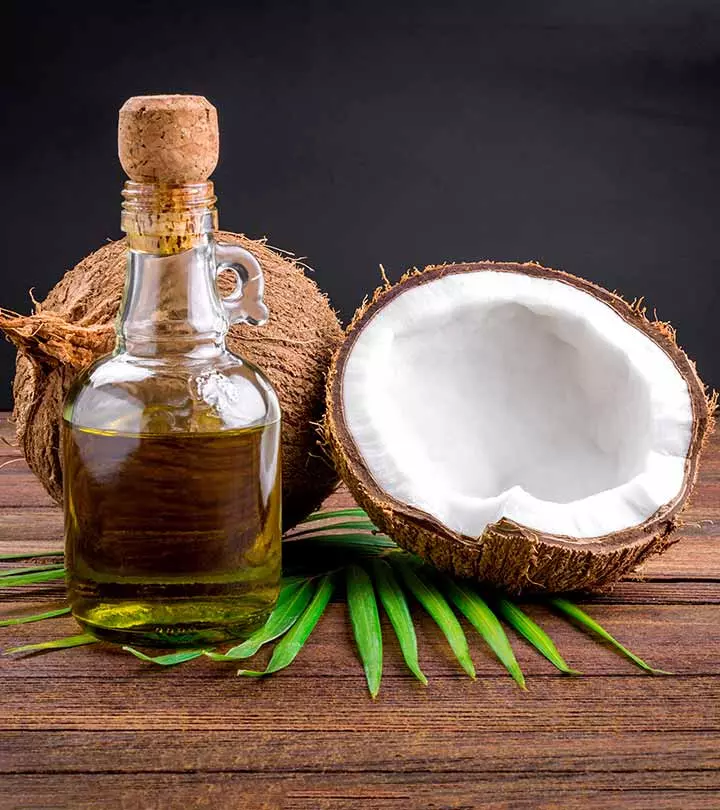
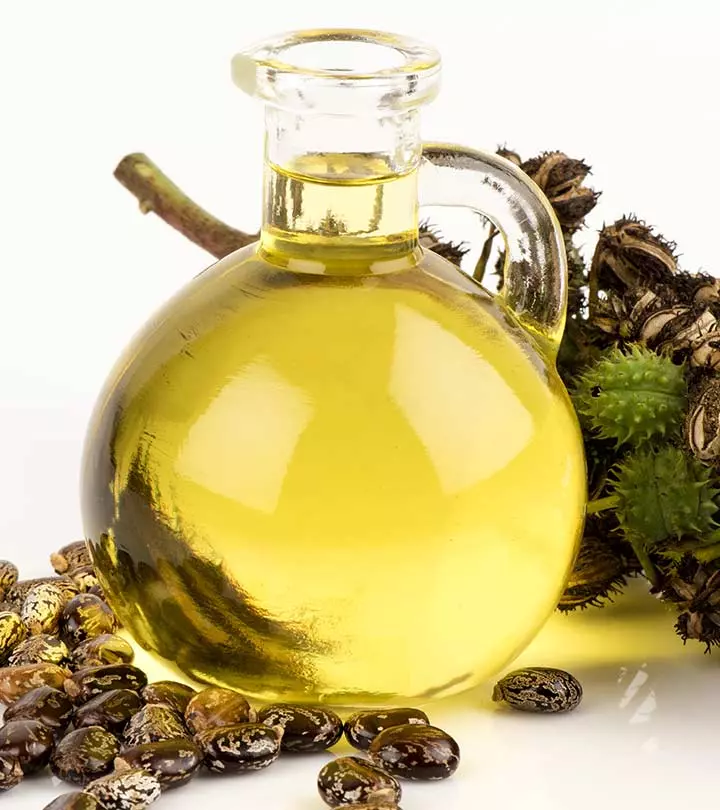
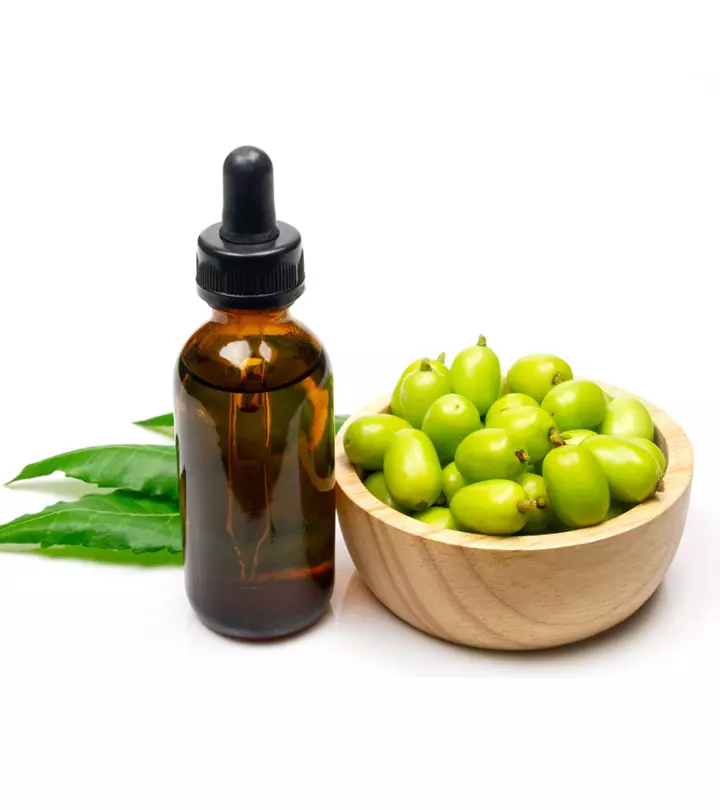
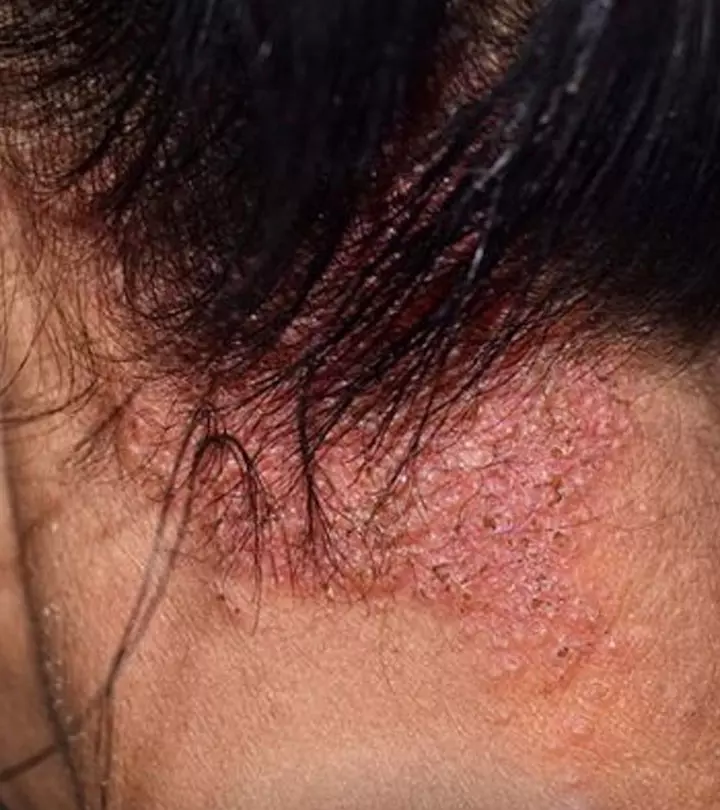
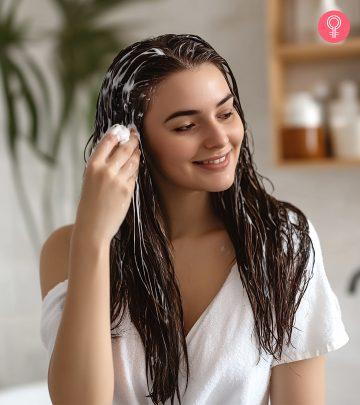


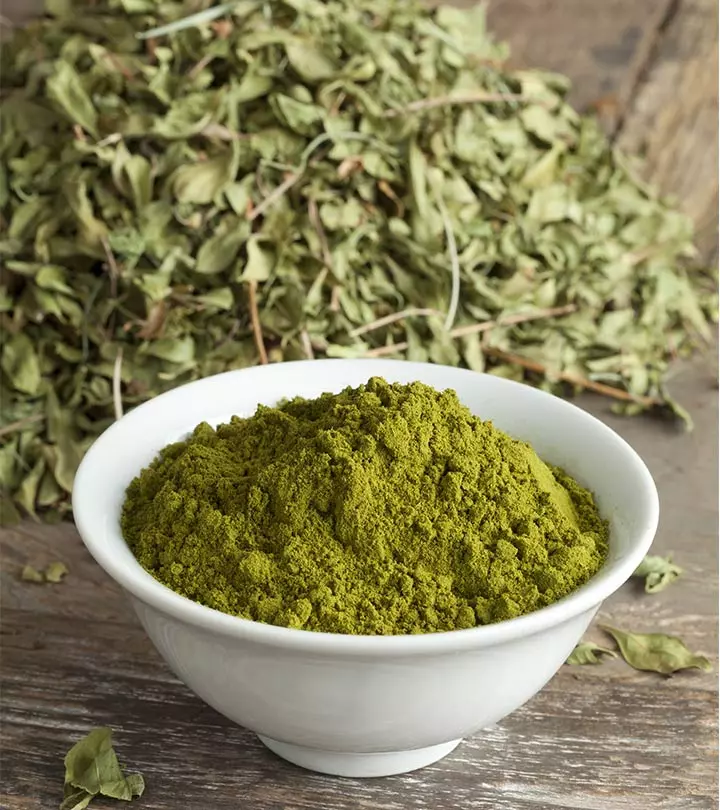


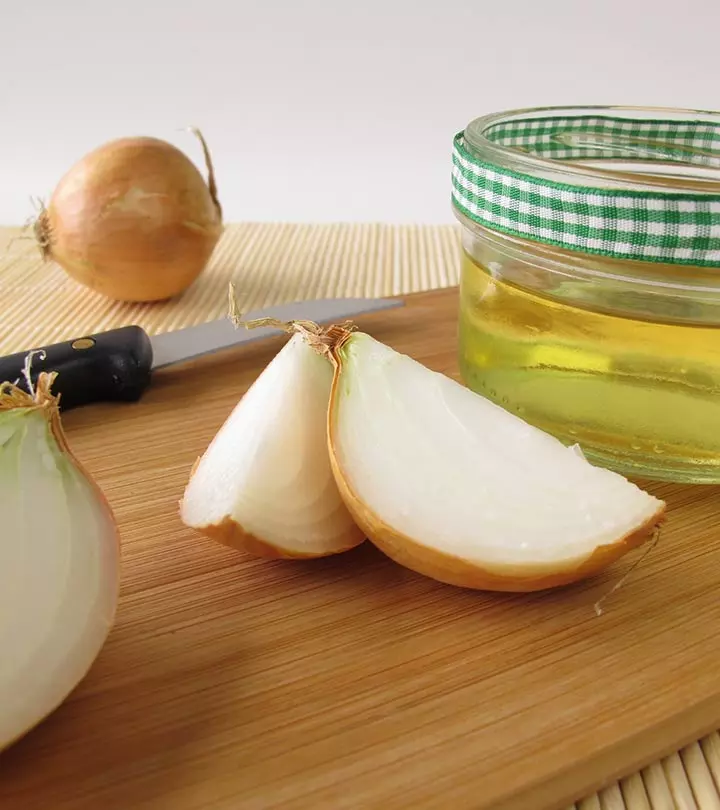
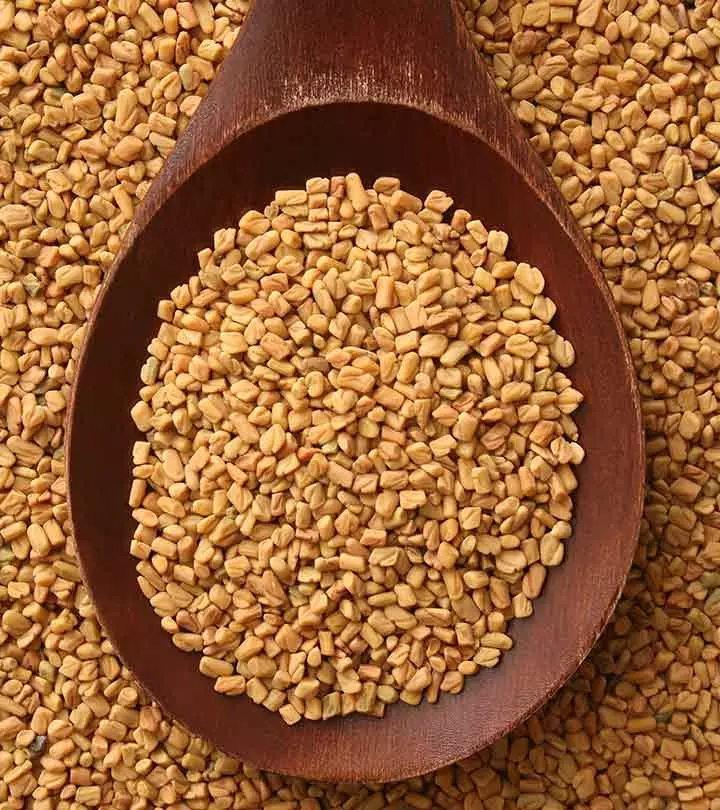

Community Experiences
Join the conversation and become a part of our empowering community! Share your stories, experiences, and insights to connect with other beauty, lifestyle, and health enthusiasts.